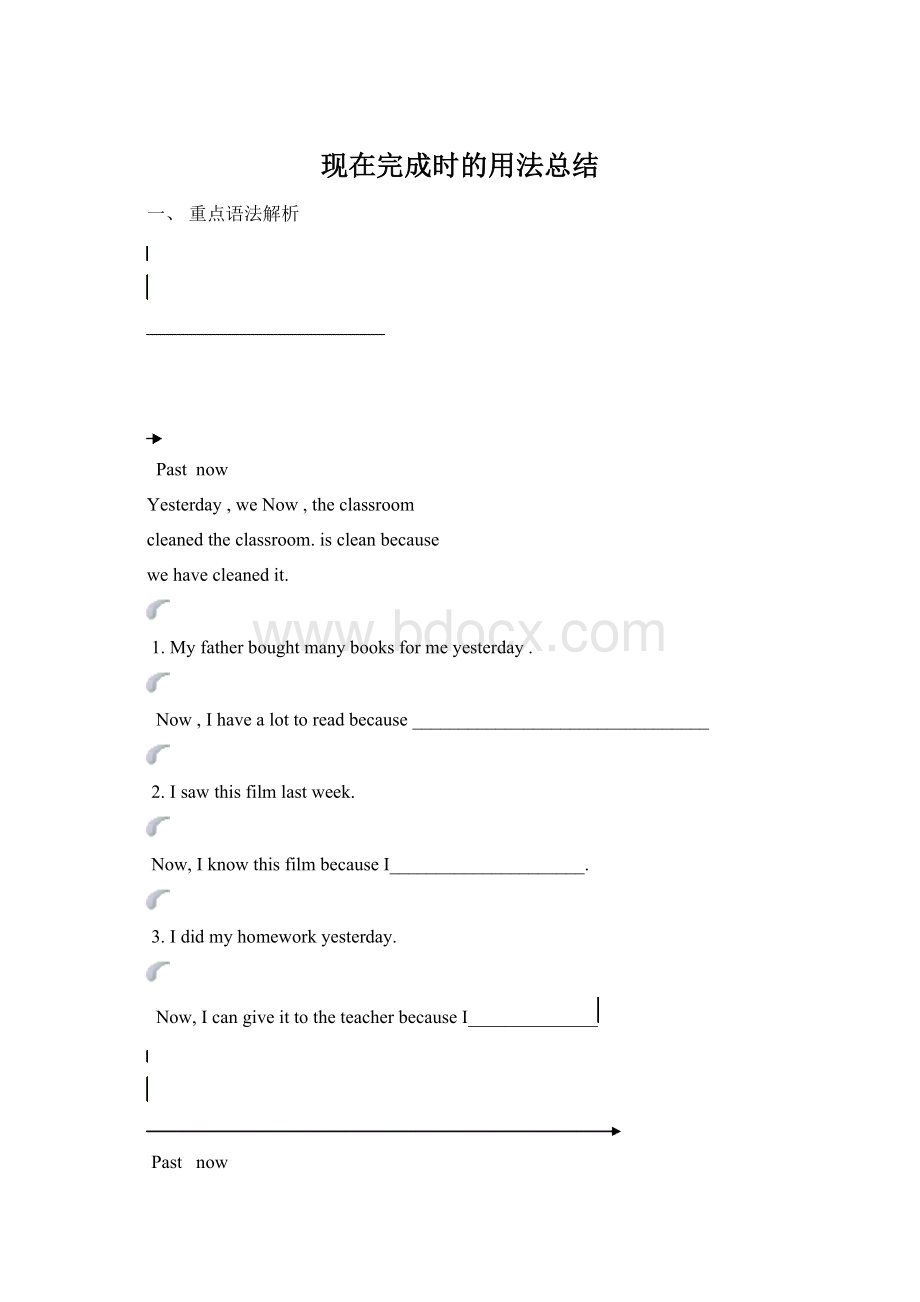现在完成时的用法总结.docx
《现在完成时的用法总结.docx》由会员分享,可在线阅读,更多相关《现在完成时的用法总结.docx(11页珍藏版)》请在冰豆网上搜索。

现在完成时的用法总结
一、重点语法解析
Pastnow
Yesterday,weNow,theclassroom
cleanedtheclassroom.iscleanbecause
wehavecleanedit.
1.Myfatherboughtmanybooksformeyesterday.
Now,Ihavealottoreadbecause________________________________
2.Isawthisfilmlastweek.
Now,IknowthisfilmbecauseI_____________________.
3.Ididmyhomeworkyesterday.
Now,IcangiveittotheteacherbecauseI______________
Pastnow
IbegantoteachIhavetaughtEnglishatthis
Englishatthisschoolfiveschoolforfiveyears.
yearsago.
1.Iamadoctor.IbegantoworkwhenIwas22.Now,Iam26.I________forfouryears.
2.WewenttotheUSAlastMonday.TodayisMonday.We_________(stay)intheUSAsincelastMonday.
1、现在完成时:
表示过去发生或已经完成的某一动作对现在造成的影响或结果,或从过去开始一直延续到现在的动作或保存的状态,强调的是现在的情况,常用for和since表示一段时间的状语或sofar,now,today,thisweek(month,year)等表示包括现在时间在内的状语。
不能和表示过去的时间状语连用(如:
in1990,lastSunday等)。
例如:
HehasstudiedEnglishfor5years.
HehasstudiedEnglishsince2001.
NowIhavefinishedthework.
注意:
表过去某一时间发生的动作或状态一直延续到现在(强调现在),动作或状态一般是延续性的,因此要用表延续性的动词或表状态的动词。
表示短暂时间动作的词,如:
come,go,die,marry,buy等的完成时不能与for,since等表示一段时间的词连用。
也不能用于howlong引导的疑问句中。
如不能说:
Hehasborrowedthebookfortwomonths.(ⅹ)
但可以说:
Hehaskeptthebookfor2months.
或:
Ithasbeen2monthssinceheborrowedthebook.
或:
Twomonthshaspassedsinceheborrowedthebook.
这些瞬间动词常与它对应的可以表示时间段的词语进行互换。
become—beborrow—keepbuy—have
begin(start)—beonopen—beopendie—bedead
leave--beawaycome--behere/ingoout—beout
join--beamember/beinbegintostudy--study
注明:
非延续性动词在否定结构中可用于现在完成时态:
Ihaven’tboughtanythingfortwodays.
2、现在完成时的结构:
have/has+过去分词
否定结构:
haven’t/hasn’t+过去分词
一般疑问句中:
Have/Has+主语+动词的过去分词
3、一般过去时:
一般过去时只表示过去的动作或状态,和现在不发生关系(即动作或状态在现在已经结束),它可以和表示过去的时间状语连用。
现在完成时与一般过去时的区别:
现在完成时用来表示之前已发生或完成的动作或状态,其结果的确和现在有联系。
动作或状态发生在过去,但它的影响现在还存在;而一般过去时表示过去的事实,不表示和现在的关系。
IhavejustbeentoLondon.Iwenttherelastmonth.我刚去过伦敦,是上个月去的。
1.过去时表示过去某时发生的动作或单纯叙述过去的事情,强调动作;现在完成时为过去发生的,强调过去的事情对现在的影响,强调的是影响。
2.过去时常与具体的时间状语连用,而现在完成时通常与模糊的时间状语连用,或无时间状语。
一般过去时的时间状语:
yesterday,lastweek,…ago,in1980,inOctober,justnow,具体的时间状语共同的时间状语:
thismorning,tonight,thisApril,now,once,before,already,recently,lately
现在完成时的时间状语
for,since,sofar,ever,never,just,yet,till/until,uptonow,inpastyears,always,
3.现在完成时可表示持续到现在的动作或状态,动词一般是延续性的,如live,teach,learn,work,study,know.
过去时常用的非持续性动词有come,go,leave,start,die,finish,become,getmarried等。
举例:
Isawthisfilmyesterday. (强调看的动作发生过了。
)
Ihaveseenthisfilm. (强调对现在的影响,电影的内容已经知道了。
)
Whydidyougetupsoearly?
(强调起床的动作已发生过了。
)
Whohasn'thandedinhispaper?
(强调有卷子,可能为不公平竞争。
)
ShehasreturnedfromParis. 她已从巴黎回来了。
Shereturnedyesterday. 她是昨天回来了。
HehasbeenintheLeagueforthreeyears. (在团内的状态可延续)
HehasbeenaLeaguememberforthreeyears. (是团员的状态可持续)
HejoinedtheLeaguethreeyearsago. (三年前入团,joined为短暂行为。
)
Ihavefinishedmyhomeworknow.
---WillsomebodygoandgetDr.White?
---He'salreadybeensentfor.
句子中如有过去时的时间副词(如yesterday,last,week,in1960)时,不能使用现在完成时,要用过去时。
(错)Tomhaswrittenalettertohisparentslastnight.
(对)Tomwrotealettertohisparentslastnight.
二、动词的过去分词的规则变化
1、规则动词:
规则动词的过去分词的构成规则与规则动词的过去式的构成规则相同。
四点变化规则:
(1)、一般动词,在词尾直接加“ed”。
work---worked---worked,visit---visited---visited
(2)、以“e”结尾的动词,只在词尾加“d”。
live---lived---lived,
(3)、以“辅音字母+y”结尾的动词,将"y"变为"i",再加“ed”。
study---studied---studied,cry---cried---cried
(4)、重读闭音节结尾,末尾只有一个辅音字母,先双写该辅音字母,再加“ed”。
stop---stopped---stopped,drop---dropped--dropped
2、不规则动词的过去式以及过去分词巧记规律:
AAA:
cost-cost-costread-read-read
put-put-putcut-cut-cut
let-let-letset-set-set
beat-beat-beathit-hit-hit
hurt-hurt-hurtspit-spit-spit
rid-rid-rid
注:
原形、过去式和过去分词的词形和读音都相同的单词,结尾字母一般是t或d。
特殊:
动词read的过去式和过去分词虽然词形与原形一致,read-read-read,但发音分别是[ri:
d]-[red]-[red]。
ABA(含规则动词):
有些动词的过去分词与原形是一样的:
run-ran-runcome-came-come
become-became-becomeovercome-overcame-overcome
ABB(含规则动词):
1.另有一些其它形式的变化。
have(has)-had-hadleave-left-left
lose-lost-lostmake-made-made
feel-felt-feltspell-spelt-spelt
stand-stood-stood
2.改变单词中间元音字母。
sit-sat-sat(babysit)win-won-won
shine-shone-shonehold-held-held
find-found-foundhear-heard-heard
hang-hung(hanged)-hung(hanged)
ABC:
有些动词的过去分词是在原形词尾加n或en,变成以en结尾的单词。
take-took-takengive-gave-given
fall-fell-falleneat-ate-eaten
write-wrote-writtenspeak-spoke-spoken
freeze-froze-frozenride-rode-ridden
get-got-gotten(got)forget-forgot-forgotten(forgot)
特殊:
am/is-was-beenare-were-been,
do(does)-did-donego-went-gone
see-saw-seenshow-showed-shown(showed)
lie-lay(lied)-lain(lied)
三、重难点词汇精讲
1.Haveyoueverbeentoanamusementpark?
Øhavebeento...
havebeento+地点:
去过某地(已回)
havebeento表示“到(去)过某处”,现在已不在那个地方。
如:
HehasbeentoEngland. 他曾到过英国。
(现在已经不在英国了)
HaveyoueverbeentotheGreatWall?
你到过长城吗?
(现在已经不在长城上)
Øhavegoneto+地点:
去了某地(未回)
havegoneto表示“去了某处”,“到某处去了”,现在已不在说话的地点了。
如:
HehasgonetoEngland。
他已去英国了。
(已经不在说话的地方,到达英国或者在去英国的路上)
2、ever,never,already,yet,still
1)ever常用于否定句、疑问句中。
vever常用于现在完成时中。
vever用于强化比较级和最高级。
What'sthebestgiftyouhaveeverreceived?
veversince:
自那时起
Theshophasbeenopeneversince.
forever:
永远的(地)
2)★never:
从不
-Haveyoueverbeentoanamusementpark?
-No,never.
★already:
已经(肯)
--yet:
已经,还(否、疑)
HehasalreadybeentoBeijingtwice.
Hehasn'tbeentoBeijingyet.
--HaveyoubeentoBeijingyet?
--No,notyet.
★still:
仍然,还;常用于肯定句中
3、neither
(1)NeitherJennynorIownacar.
(2)Leonneitherdrinksnorsmokes.
(3)Myhusbanddoesn’twanttoseea
movietonight,andneitherdoI.
(4)A:
Whichofthedressesdidyoulike?
B:
Neitherofthem.
(5)A:
Ihaven’tseenthatmovie.
B:
Ihaven’t,either.
(NeitherhaveI.)
(Me,neither)
形容词,意为“两者都不”,置于单数名词前
Neithergirlhasbeentherebefore.
--两个女孩以前都没去过那。
代词,意为“两者都不,双方均不”。
Neitherofthegirlshasbeentherebefore.
Ilikeneither.--
连词,
常用短语:
neither...nor...
表示“既不...,也不...。
”
NeitherhenorI____interestedinit.(be)--___原则
Iwillbelieveneitheryounor___.(he)
副词,作“也不”,放在句首,表示前面否定的内容也适用于后面的人或物,形容词或副词提前,需用倒装句。
注意:
neither作主语时,通常被视为单数,但有复数意义。
vneither...nor...;either...or...;notonly...,butalso...连接两个并列结构,句型中使用就近原则,both...and...句型中,谓语动词用复数形式。
--Idon'tlikethisdress.
--NeitherdoI.--我也不喜欢。
(Idon'tlikethisdress,either)
Ihaven’tbeentoanamusementpark.
Me,neither.(对应:
Me,too.)
=Ihaven'tbeentoanamusementpark,either.(not...either=neither)
=NeitherhaveI.
Ifyoucan'tsolveit,neithercanhe.(Hecan'tsolveit,either.)
Iamnotinterestedinit,neitherishe.(Heisnotinterestedinit,either.)
练:
Ifyoudon'thelpme,neither___others.
4、neither,nor,so引导的倒装句:
1)句式:
vNeither/Nor/So+助动词/be动词/情态动词+主语.表示“...也/也不”。
NeitherdoI.=NordoI.--我也不。
SodoI.--我也是。
vSo+主语+助动词/be动词/情态动词.表“确实如此”,用于同意上文中的对方的观点。
--Itisaniceday.
--Soitis.--它确实是个好天气。
三、综合练习
一、单项选择
1、He_______toCanada,soyoucan’tseehimrecently.
AhavebeentoBhavegonetoChasbeentoDhasgoneto
2、IhavebeentoAmerica,so_____he.
AdidBhaveChasDdoes
3、LondonhaseverhostedthemodernOlympicsParis.
A.SodoesB.Sohas
C.NordoesD.Neitherhas
4、Neitherofthetwoboys________fromtheUSA.
A.comeB.don’tcomeC.comesD.doesn’tcome
5、IhavenotbeentoAmerica,_____hashe.
AsoBneitherCandDbut
6、Hergrandfather______fortwoyears.
A.died B.hasdied C.hasbeendead D.hasbeendied
7、Bothhisparentslooksad.Maybethey_________what'shappenedtohim.(呼和浩特)
A.knewB.haveknownC.mustknowD.willknow
8、Hehas_______beentoShanghai,hashe?
A.alreadyB.neverC.everD.still
9、HaveyoumetMrLi______?
A.justB.agoC.beforeD.amomentago
10、Thefamouswriter_____onenewbookinthepasttwoyears.
A.iswritingB.waswritingC.wroteD.haswritten
11、—Ourcountry______alotsofar.
—Yes.Ihopeitwillbeeven______.
A.haschanged;wellB.changed;good
C.haschanged;betterD.changed;better
12、ZhaoLan______already______inthisschoolfortwoyears.
A.was;studyingB.will;study
C.has;studiedD.are;studying
13、We______XiaoLisinceshewasalittlegirl.
A.knowB.hadknownC.haveknownD.Knew
14、HarryPotterisaverynicefilm.I_______ittwice.
A.willseeB.haveseenC.sawD.see
15、—ThesefarmershavebeentotheUnitedStates.
—Really?
When_____there?
A.willtheygoB.didtheygo
C.dotheygoD.havetheygone
16、—______you___yourhomeworkyet?
—Yes.I_____itamomentago.
A.Did;do;finishedB.Have;done;finished
C.Have;done;havefinishedD.will;do;finish
17、Hisfather______thePartysince1978.
A.joinedB.hasjoinedC.wasinD.hasbeenin
18、—Doyouknowhimwell?
—Sure.We_________friendssincetenyearsago.
A.wereB.havebeenC.havebecomeD.havemade
19、—Howlonghaveyou____here?
—Abouttwomonths.
A.beenB.goneC.comeD.arrived
20、Hurryup!
Theplay__________fortenminutes.
A.hasbegunB.hadbegun
C.hasbeenonD.began
21、MissGreenisn'tintheoffice.she_______tothelibrary.
A.hasgoneB.wentC.willgoD.hasbeen
22、Myparents______Shandongfortenyears.
A.havebeeninB.havebeento
C.havegonetoD.havebeen
历年中考重现:
1.I_______ aletterfromhimsinceheleft.(天津市)
A.didn'treceiveB.haven'tgotC.didn'thaveD.haven'theard
2.—Wherehaveyou_______thesedays?
—Ihave_____toDazhuwithmyfriends.(重庆市)
A.been;goneB.been;beenC.gone;beenD.gone;gone
3.Howlonghaveyou_______thisbook?
(